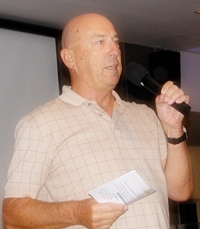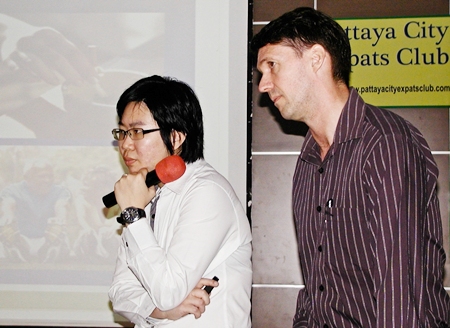Preventing colorectal cancer was the subject at the Pattaya City Expats Club’s July 24 meeting at the Amari’s Tavern by the Sea Restaurant. After the usual opening announcements, Master of Ceremonies Richard Silverberg called on fellow member Gavin Waddell, international marketing executive with Phyathai Hospital Sriracha, to introduce the speaker.
After announcing that there was nurse from the hospital giving free blood pressure readings in the back alcove, Gavin introduced Dr. Jitlada Imharit, M.D., a specialist in colorectal cancer and other diseases of the stomach and liver.
 Pattaya City Expats Club member Gavin Waddell, also international marketing executive with Phyathai Hospital Sriracha, introduces the speaker, Dr. Jitlada Imharit, M.D.
Pattaya City Expats Club member Gavin Waddell, also international marketing executive with Phyathai Hospital Sriracha, introduces the speaker, Dr. Jitlada Imharit, M.D.
Dr. Jitlada said that she would be talking about colorectal carcinoma which is a cancer of the colon or rectum. Her primary message was colorectal cancer can be prevented or detected in its early stages. Around the world, it is the third leading cause of cancer in men and the fourth leading cause in women. The frequency varies among populations. It is more common in the Western world and is rare in Asia and Africa. In countries where the people have adopted western diets, the incidence of colorectal cancer is increasing.
She recommended a low fat and high fiber diet to reduce the risk of colon cancer as well as quitting smoking and reducing alcohol intake. But most importantly, if you are 50 years of age, get screened for colorectal cancer. But, if you have a family history of colorectal cancer or high risk factors, you should get screened earlier.
If everybody aged 50 or older had regular screening tests, as many as 60% of deaths from colon cancer could be prevented. Screening saves lives because it can find precancerous polyps – abnormal growths in the colon or rectum – so that they can be removed before turning into cancer.
 Dr. Jitlada spoke about colorectal carcinoma which is a cancer of the colon or rectum. Her primary message was colorectal cancer can be prevented or detected in its early stages. If everybody aged 50 or older had regular screening tests, as many as 60% of deaths from colon cancer could be prevented.
Dr. Jitlada spoke about colorectal carcinoma which is a cancer of the colon or rectum. Her primary message was colorectal cancer can be prevented or detected in its early stages. If everybody aged 50 or older had regular screening tests, as many as 60% of deaths from colon cancer could be prevented.
Screening also helps find colorectal cancer at an early stage, when treatment often leads to a cure. About nine out of every 10 people whose colorectal cancer is found early and treated are still alive five years later.
Polyps are slow growing, so if you have a colonoscopy and no polyps were found, you can wait about 10 years before having another one. However, if polyps are found and removed, you should have another colonoscopy in another 3 to 5 years.
Dr. Jitlada also described some other screening methods, but explained why a colonoscopy was the most effective in detecting polyps. But, most importantly, during the procedure polyps can be removed before they can become cancerous.
 Following the presentation and regular items, Richard Silverberg called on Roy Albiston to conduct the always informative and sometime humorous Open Forum.
Following the presentation and regular items, Richard Silverberg called on Roy Albiston to conduct the always informative and sometime humorous Open Forum.
She also described symptoms that can indicate you have colorectal cancer; but by the time symptoms appear, the cancer may have already existed for a long time. These symptoms can be varied and by themselves may not be the result of colorectal cancer. You should be alert for the following symptoms: change in bowel habits, narrow stools, diarrhea or constipation, red or dark blood in the stool, weight loss, and abdominal pain. There are other causes for these type symptoms, but if you have them, you should seek a medical diagnosis to rule out colorectal cancer.
If cancer is found and it has not spread, the most common treatment is a resection of the bowels. Patients that have this surgery can experience long-term survival in excess of 80%. However, in patients with advanced colon cancer, where the tumor has penetrated beyond the bowel wall and there is evidence of metastasis (spreading) to distant organs, the five-year survival rate is less than 10%. In conclusion, she pointed out that screening and proper diet are the best preventative measures.
 Dr Jitlada and Gavin listen intently to a member’s question re the difference between colonoscopy and sigmoidoscopy.
Dr Jitlada and Gavin listen intently to a member’s question re the difference between colonoscopy and sigmoidoscopy.
After Dr. Jitlada answered several questions from the audience, Richard Silverberg brought everyone up to date on upcoming events and called on Roy Albiston to conduct the always informative and sometime humorous Open Forum where questions are asked and answered about expat living in Thailand, recommendations for restaurants and movies are made, and perhaps a joke or two are told.




